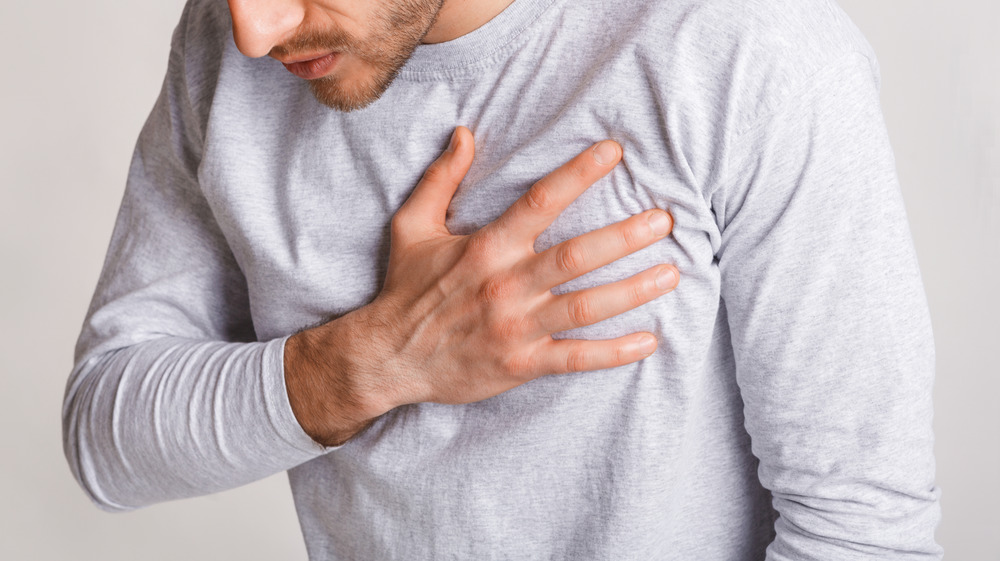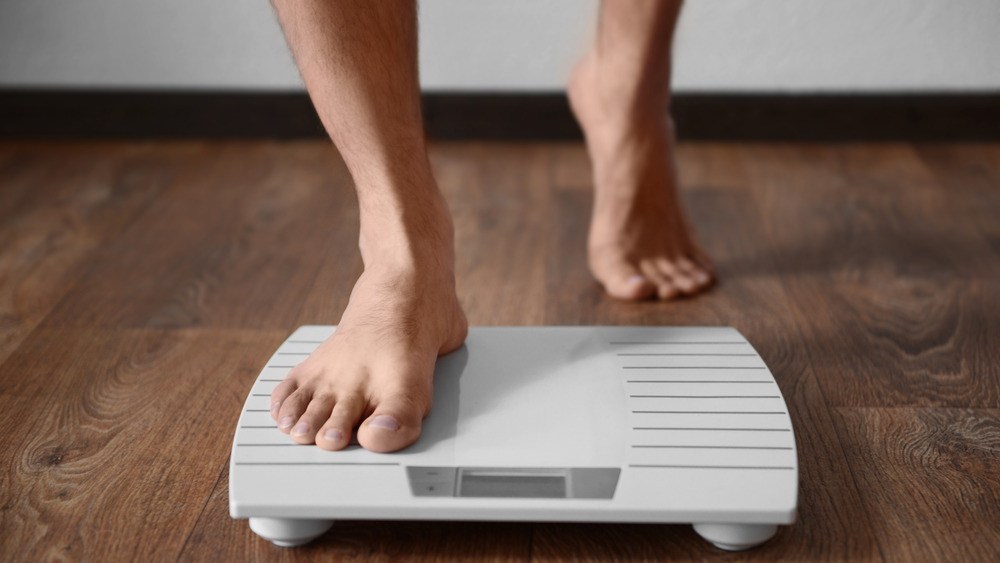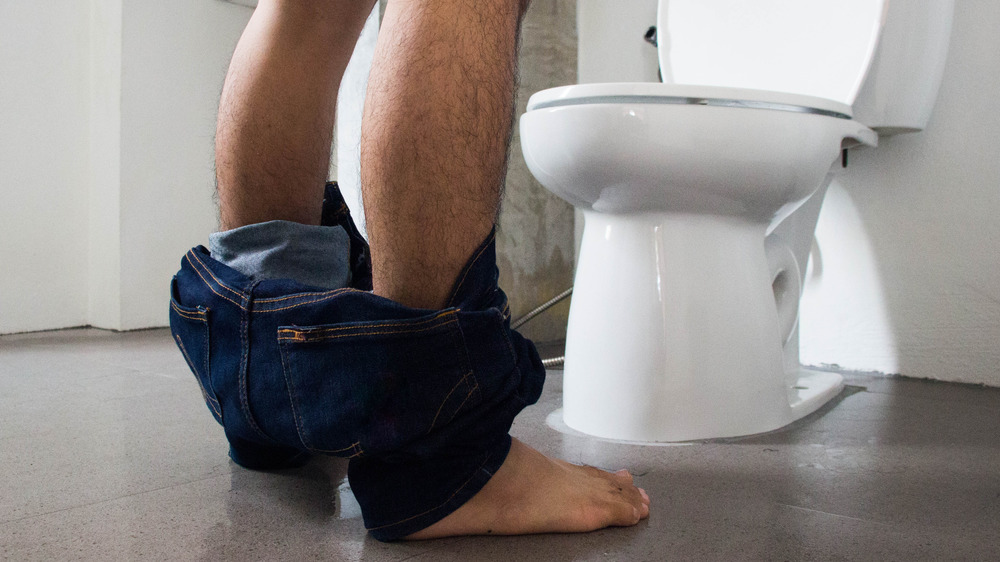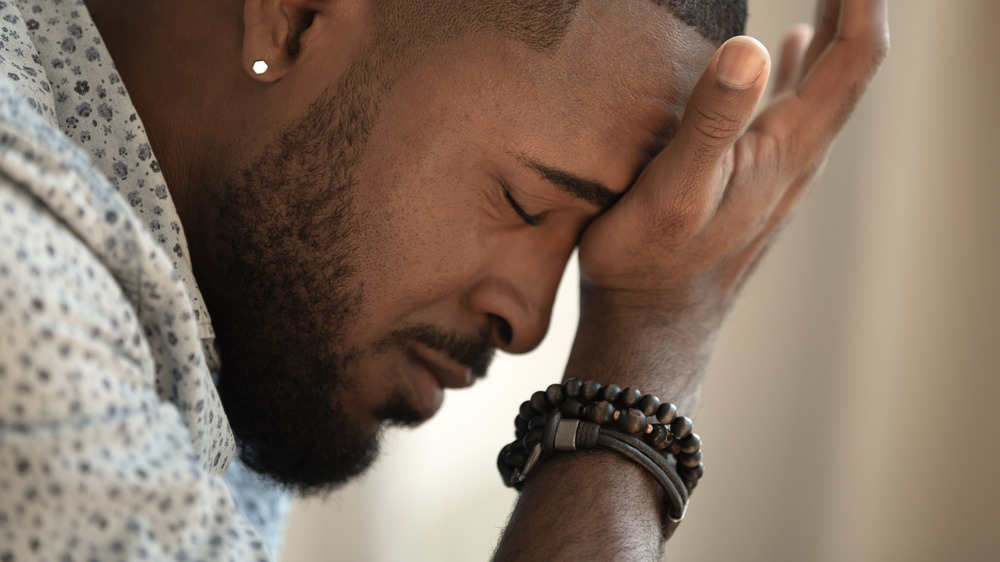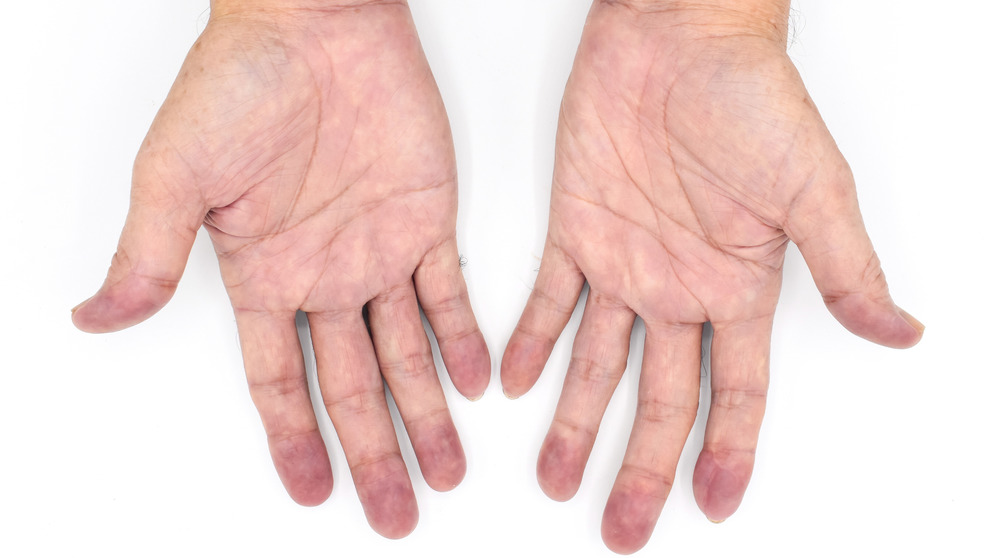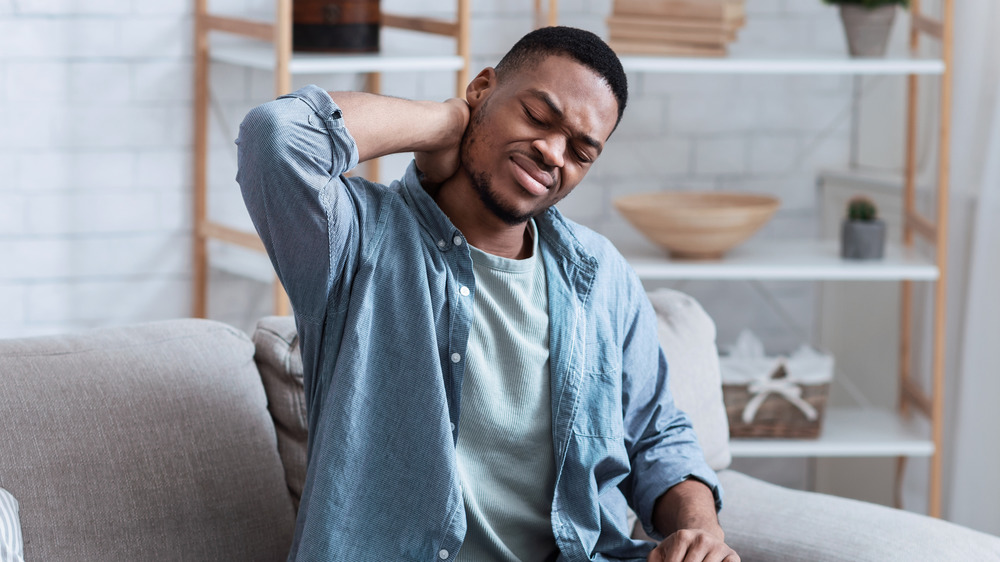Health Symptoms Men Should Never Ignore
Demographic data confirms what medical professionals stress: Women live longer then men. Or, stated more bluntly, men die earlier. This reality raises the question: Is the behavior of men to blame? Studies have shown that men are less likely to make time for preventive care. Compared to women, they meet with doctors less frequently and visit emergency rooms less often.
Ignoring physical symptoms means a lower likely hood of being diagnosed with one of the leading causes of death, which for men includes heart disease and cancer. Additionally, when health symptoms are ignored, quality of life issues are at stake.
Patients with diabetes, in particular, have been ignoring signs and symptoms, which has lead to an increase in limb amputations, especially during the pandemic, Dr. Patrick McEneaney, physician, owner, and CEO at Northern Illinois Foot & Ankle Specialists outside of Chicago, Illinois, told Health Digest. He couldn't stress enough how important it is to keep up with medical appointments and strongly encourages everyone to see a professional — even over the small things. "I wish men realized that a lot of these symptoms they're brushing off can have severe consequences in regard to parts of their body they really, really, really need to work well," said McEneaney.
Chest pain
The most pressing symptom a man must never ignore is the sudden onset of chest discomfort, typically beneath the breast bone, radiating across the chest. It could point to heart disease, the number one leading cause of death of males in the United States (via CDC).
"Frequently there is an impending sense of doom [with chest pain]; shortness of breath may occur, as well as profuse sweating," Dr. Stephen Sinatra, a board-certified cardiologist and certified nutrition specialist, told Health Digest. "This is one symptom that should be investigated promptly especially if the symptoms last for more than a few minutes."
Not all chest pain is ominous, according to the Cleveland Clinic, but all chest pain should be taken seriously. "This can be a sign of angina or ischemic heart disease and can be a precursor for a heart attack or myocardial infarction, which can be deadly," Dr. Brett A. White, instructor of clinical science at the Kaiser Permanente Bernard J. Tyson School of Medicine, told Health Digest. Sadly, sudden cardiac death may be the first symptom of hidden heart disease up to approximately 50 percent of the time. If you feel anything out of the ordinary, consult your doctor.
Major weight gain or loss
Everyone's weight fluctuates from time to time. In fact, our weight fluctuates, on average, 2.2 to 4.4 pounds over the course of a few days (via Medical News Today). Often there's an explanation to the weight gain or loss, like changes to your diet or exercise routine. While we should be wary not to let our weights fluctuate too much (studies suggest our bodies can't recover from sudden drastic changes), it's really the unexpected changes that can be most worrisome.
If you haven't made any moderations to your diet or fitness regime, the number on the scale can be surprising. "For a guy, five pounds is kind of — ding-ding — something's going on here," Dr. Lawrence Cheskin, director of the Johns Hopkins Weight Management Center, told Men's Health.
Both unexplained sudden weight gain and weight loss can be a symptom of thyroid disorder (via Verywell Health). Left untreated, thyroid diseases — like hypothyroidism (an underactive thyroid) and hyperthyroidism (an overactive thyroid) — can become life threatening.
Changes in stool
You might not want to talk about your stools, but doing so could just save your life. This is especially true if you've noticed changes to your stool's frequency, consistency, or color (via Cleveland Clinic). For instance, stools described as red or black might indicate the presence of blood.
"Passing blood in the bowels is perhaps the most worrisome sign that could indicate colon cancer," Dr. Brett A. White, instructor of clinical science at the Kaiser Permanente Bernard J. Tyson School of Medicine, told Health Digest, "particularly if happening to a male that is over the age of 50 and for the first time."
Early detection of colon cancer significantly improves survival rates (via American Cancer Society). "Diagnosis at stage one leads to a five-year survival rate of 100 percent for women and 95 percent for men, decreasing dramatically by stage four, with five-year survival rates of just 10 percent and 5 percent respectively," Dr. Chun Tang, a general practitioner at the U.K. practice Pall Mall Medical, told Health Digest. "It is vital that if you experience this symptom that you seek medical attention straight away so that if it is bowel cancer, you are diagnosed early to prolong your life."
Changes in urination
For many men, prostate cancer doesn't present symptoms — a reason it's so important to get regular screenings for the disease. "It's often referred to as the silent killer," Dr. Michael Esposito, co-director of Robotic Laparoscopic and Endourology Followship at Hackensack University Medical Center Meridian Health and clinical assistant professor of urology/surgery at the University of Medicine and Dentistry of New Jersey, told Health Digest.
When symptoms do arise, though, they should not be ignored. These include having difficulty urinating, decreased force in the stream of urine, increased frequency of urination (especially at night, sometimes urgently), blood in the urine, and even nighttime dribbling. "Most men don't want to talk about waking up in the middle of the night with some dribbling," Dr. Patrick McEneaney, physician, owner, and CEO at Northern Illinois Foot & Ankle Specialists, told Health Digest. "But with urinary frequency, you're talking about prostate cancer."
According to Esposito, "The earlier prostate cancer is detected, the higher chance of survival — in fact, if the disease is caught early, there's a nearly 100 percent chance of survival. But, sadly, if the disease is caught late, there's only a 30 percent chance of survival."
Numbness or tingling in the arms, hands, or fingers
Pain or tingling in the shoulder, arm, hands, or fingertips could be a symptom of thoracic outlet syndrome (TOS). Dr. Jeffrey Apple, a vascular surgeon in Austin, Texas, told Health Digest he's seeing this condition in men between 20 and 40 years of age, especially athletes. "TOS occurs when the blood vessels and nerves in between your collarbone and upper ribs (or thoracic outlet) become compressed, causing pain and/or numbness in your neck, shoulders, arms, and fingers," Apple explained. "This is often caused by repetitive or overuse injuries in sports or workouts."
However, there are additional conditions that cause that kind of discomfort, including arthritis, pinched nerves, and carpal tunnel (via WebMD). That's why it's best to get yourself checked out by a doctor. Tingling feet are also of concern.
"Numbness burning and tingling in the hands and feet, especially in the feet, can be an early sign of diabetes," podiatrist Patrick McEneaney of Northern Illinois Foot & Ankle Specialists told Health Digest. High blood sugar can lead to diabetic neuropathy, a type of nerve damage caused by diabetes, generally beginning in the feet (via Mayo Clinic).
Leg cramps
As anyone who has woken up at night with what is commonly referred to as a Charley Horse knows, muscle spasm pain is real. Experts suggest this tightening up of the calf is likely due to muscle fatigue, though there are other medical conditions that might be to blame (via American Family Physician).
Most muscle cramps are due to muscular strain or overuse or even dehydration. Rest and rehydration typically helps in those instances. But "if people are experiencing cramping in their legs while they are walking, it could be a sign of what's called intermittent claudication," Dr. Patrick McEneaney, physician, owner, and CEO at Northern Illinois Foot & Ankle Specialists outside of Chicago, Illinois, told Health Digest. And that can be a symptom of vascular disease.
The cramping associated with intermittent claudication is the result of an arterial flow obstruction. It's associated with an increased risk of death from cardiovascular disease. "If you have blockages in your arteries and you're only getting half the amount of blood you should be, then the muscles will cramp up and you won't be able to walk anymore until the right amount of blood gets back down to an area," McEneaney explained.
An enlarged testicle
According to University of Utah Health, an enlarged testicle could be the result of an injury or infection. It could indicate a fluid build up or varicocele (a varicose vein). It could be the result of trauma. Unfortunately, it can also be a symptom of cancer.
"Testicular cancer is one type of cancer that actually affects younger men more often (age 20 to 50) and presents typically as a non-painful enlargement of the testicle," Dr. Brett A. White, instructor of clinical science at the Kaiser Permanente Bernard J. Tyson School of Medicine, told Health Digest.
Risk factors for testicular cancer include undescended testicle, family history of testicular cancer, and HIV infection. "It is important for men to pay attention to their testicles and perform a testicular exam once per month," Dr. Jennifer Stone, board-certified family nurse practitioner and practicum coordinator for Walden University's Master of Science in Nursing nurse practitioner programs, told Health Digest. "Testicles that are found to have a painless lump, change in size or shape, and/or a heaviness in the scrotum should be investigated further."
Dry mouth
According to Mayo Clinic, dry mouth occurs "when the salivary glands don't make enough saliva to keep your mouth wet." But what is the underlying cause of dry mouth, and why should men take it seriously?
"Men are at higher risk of heart disease, which makes them more likely to take a lot of medications. That is often the cause of dry mouth," Dr. Henry Hackney, a dentist in Chicago and director of content at the not-for-profit organization, Authority Dental, told Health Digest. "While this condition is not necessarily indicating other health issues, it leads to bad breath, cavities, and loose teeth." If you notice chronic dryness in your mouth after taking new prescriptions, tell your doctor about your symptoms. You may be able to have your treatment adjusted.
Additionally, dry mouth might be attributed to a long list of other conditions, like Alzheimer's disease, diabetes, rheumatoid arthritis, hypertension, Parkinson's disease, or stroke (via WebMD).
Undue or exaggerated anger and irritation
Mental health is just as important as physical health for men and women alike. However, men die by suicide more often than women, according to the Centers for Disease Control and Prevention, and they are less likely to seek professional mental health help (via The Guardian).
"With examples like Anthony Bourdain and Robin Williams, men's mental health has never been more important," Hannah Milford, a licensed professional counselor and supervisor at Happy Camper Counseling, in Austin, Texas, told Health Digest. According to Milford, your mental health might need extra support if you are experiencing the following: undue or exaggerated anger and irritation, disturbance in sleep (like difficulty falling or staying asleep), loss of motivation or interest in things that used to bring joy, prolonged sadness or apathy, or suicidal or other dark thoughts. "It's important to destigmatize men's mental health and normalize self-care," said Milford. "Seeking the support of a licensed mental health therapist can literally save lives."
If you or someone you know is having suicidal thoughts, please call the National Suicide Prevention Lifeline at 1-800-273-TALK (8255) or text HOME to the Crisis Text Line at 741741.
Erectile dysfunction
Erectile dysfunction (ED) is defined by Healthline as "the inability to get or keep an erection firm enough to have sexual intercourse." And it can be a sign of vascular disease. "When a man gets erect, essentially the chambers in the penis fill up full of blood," Dr. Patrick McEneaney, physician, owner, and CEO at Northern Illinois Foot & Ankle Specialists outside of Chicago, Illinois, told Health Digest. "And if you're having issues with vascular disease, you might not be able to get an erection because you're not getting the appropriate amount of blood flow to your penis."
Sudden ED can also be a symptom and early sign of prostate cancer. "Men have a one in nine chance of developing prostate cancer during their lifetime, making it the most prevalent cancer among men, with some 190,000 cases diagnosed annually," Dr. Diego Rubinowicz, a urologist at the Urology Center of Palm Beach in Florida, told Health Digest.
According to McEneaney, ED can also indicate diabetes, hypertension, or cardiovascular disease. "It's an embarrassing topic for a guy," said McEneaney, "so they don't bring it up but it really can be an indicator of, potentially, a lot."
Dizziness or facial flushing
The next time you feel dizzy or feel your face becoming flushed, know it could be a sign of hypertension, aka high blood pressure. While the American Heart Association lists these symptoms as "inconclusively related" to high blood pressure, there is often a connection. And since nearly half of adults in the U.S. have hypertension, according to the CDC, the aforementioned symptoms are worth paying attention to.
"Hypertension is often asymptomatic, dubbed [a] 'silent killer,' but some forms do cause symptoms such as dizziness, headaches, fatigue, cramps, palpitations, weakness, and sweating," Dr. Barry Gorlitsky, nephrologist, managing partner at Carolina Nephrology, and co-founder and CEO of KidneyAide, told Health Digest.
So if you experience those symptoms, don't just check your blood pressure, see that it's high, and ignore it. "A normal blood pressure is approximately 120/80 [mm Hg]," said Gorlitsky. "So if you're consistently above this number, you are at increased risk for heart attack, stroke, or kidney disease. That's when you need to seek out a blood pressure expert like a nephrologist or cardiologist."
Weakened grip
According to a study published in the Journal of Hand Therapy, men today have significantly weaker grips than they used to (via NPR). But if you're experiencing a grip much weaker than your own norm, it's appropriate to seek medical care.
A weakened grip could be an indicator of thoracic outlet syndrome (TOS), especially if it is accompanied by a tingling in the fingers. "Most of the time a patient reports tingling in their fourth and fifth fingers and a weakening of their grip," Dr. Jeffrey Apple, a vascular surgeon in Austin, Texas, told Health Digest. According to Apple, men who have never tried more intense workouts and are going all out with too much intensity, too soon, without gradually getting acclimated to the rhythm, are most susceptible to TOS.
But it's not only active men who should pay attention to their grip strength. "The ability to stay active and independent often begins with our hands," Maria Cole, a physical therapist with Harvard-affiliated Spaulding Outpatient Center, told Harvard Men's Health Watch. "Weak grip strength can limit your enjoyment of many life pleasures, so you need to ensure your hand and grip strength always are up to the task."
Discoloration of the hands or fingers
A discoloration of your hands or fingers, or even your fingernails, might be nothing (this often happens in the cold). But it also might be something, and warrants attention as it could indicate that your circulation is abnormal. According to Verywell Health, "Oxygenated blood is bright red and gives your fingers their normal pinkish color." So it makes sense that if your blood isn't oxygenating efficiently, your skin might change color a little.
In some cases, circulation-related discoloration is limited to the fingernails; they might develop a blueish tint. This change in fingernail color is often accompanied by a change in temperature, swelling, numbness, mobility, or pain (via Medical News Today). In other cases, the discoloration might be more severe, more along the lines of an entire color change.
"Purple fingers" — or a blueish discoloration of the skin called cyanosis — might be indicative of Raynaud's syndrome, Achenbach syndrome, Chilblains, or Buerger's Disease (via Verywell Health). Treatments are available for these conditions, which is why you should seek medical attention, per Healthline.
Throbbing pain in the neck or shoulders
The most obvious explanation for pain near your neck, shoulders, or collarbone is an accident or injury. As with most injuries, you should see a doctor if symptoms persist beyond an initial course of self-treatment at home (via Mayo Clinic).
Sometimes neck pain might be attributed to a pinched nerve, which according to Mayo Clinic, "disrupts the nerve's function, causing pain, tingling, numbness or weakness." In this case, if the feeling doesn't resolve itself after resting a few days, a chiropractor could help, as could a specialist in spinal cord and nerve compression.
However, there are other conditions that might be causing undue pain in your neck, shoulders or collarbone (via Healthline). Osteoarthritis, which tends to start slowly but worsens overtime, warrants medical care. So does thoracic outlet syndrome (TOS). "TOS treatment includes physical therapy, anti-inflammatory medications, muscle relaxers, and thrombolytics to break up and prevent blood clots," Dr. Jeffrey Apple, a vascular surgeon in Austin, Texas, told Health Digest. "Severe cases require decompression surgery to relieve pressure."


